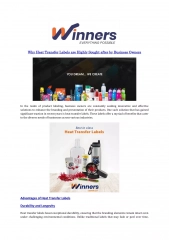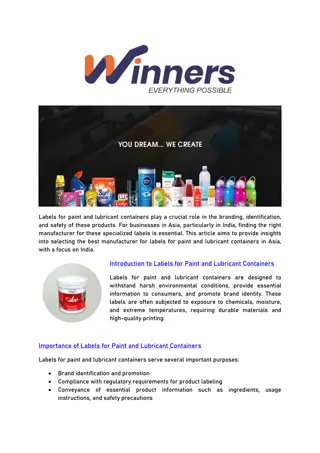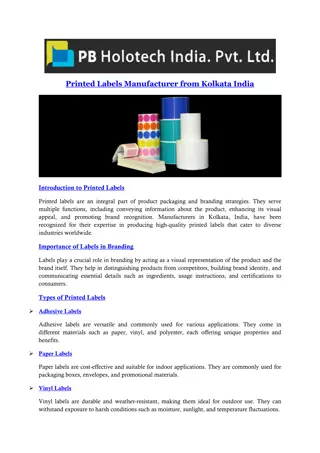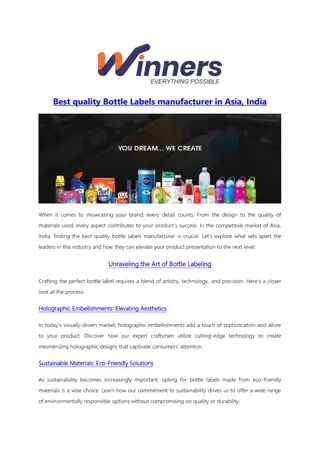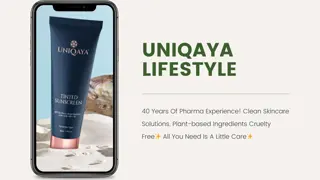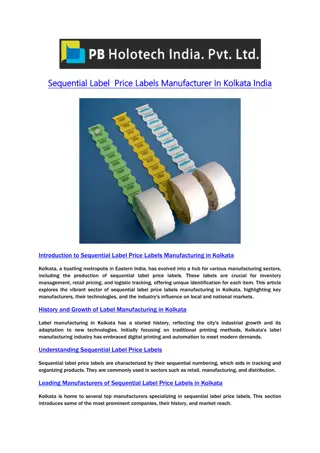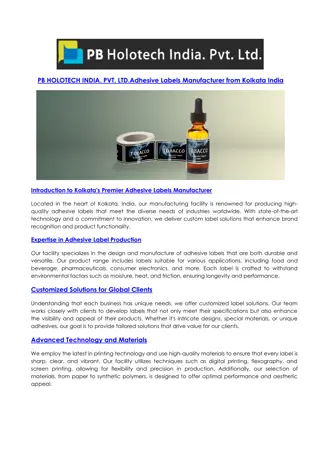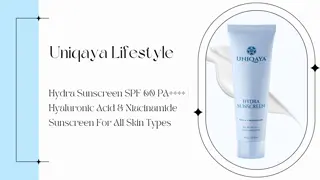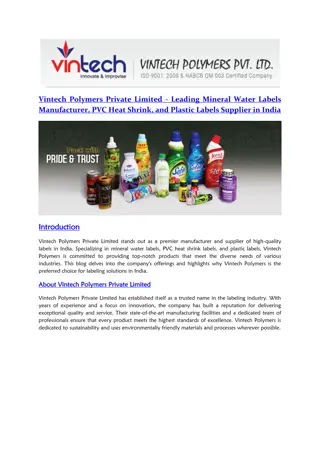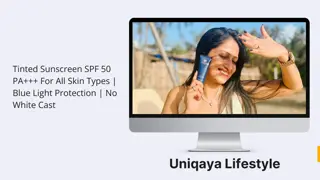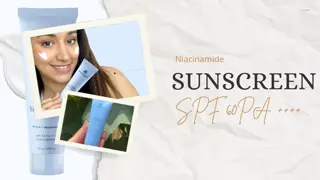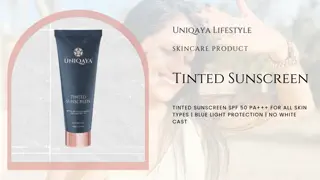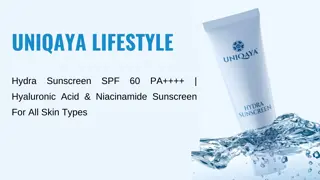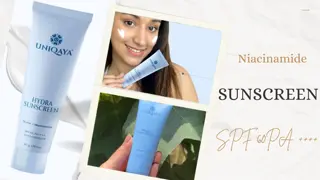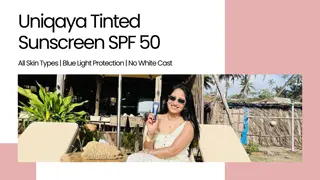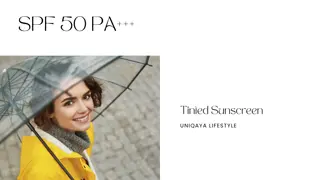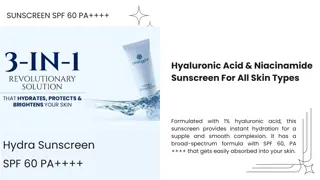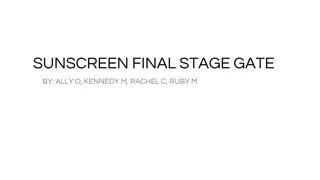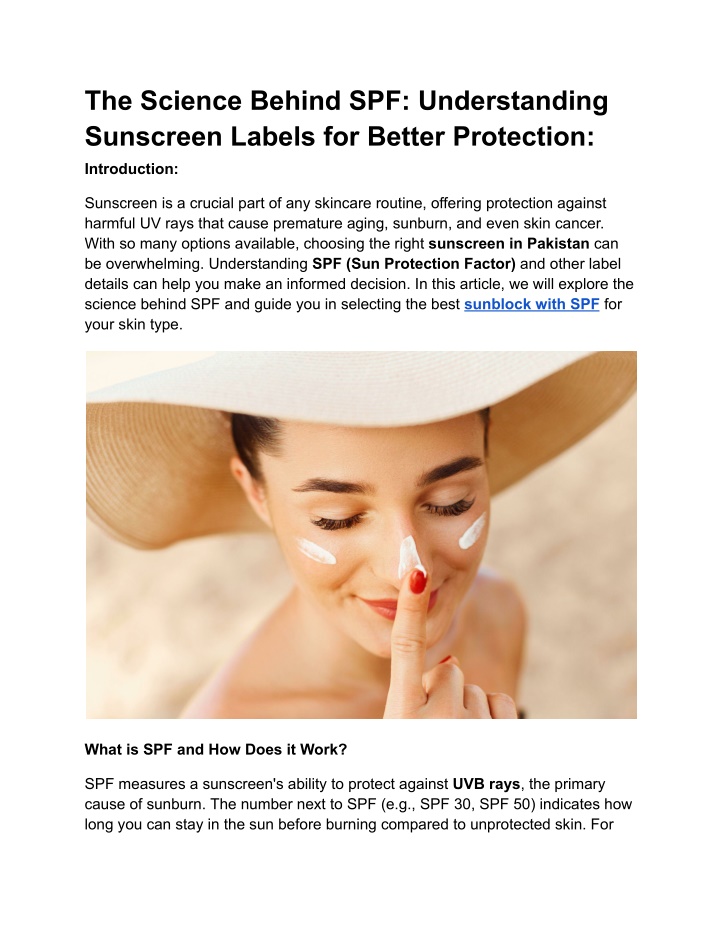
The Science Behind SPF Understanding Sunscreen Labels for Better Protection
Sunscreen is a crucial part of any skincare routine, offering protection against harmful UV rays that cause premature aging, sunburn, and even skin cancer. With so many options available, choosing the right sunscreen in Pakistan can be overwhelming.
Download Presentation

Please find below an Image/Link to download the presentation.
The content on the website is provided AS IS for your information and personal use only. It may not be sold, licensed, or shared on other websites without obtaining consent from the author. If you encounter any issues during the download, it is possible that the publisher has removed the file from their server.
You are allowed to download the files provided on this website for personal or commercial use, subject to the condition that they are used lawfully. All files are the property of their respective owners.
The content on the website is provided AS IS for your information and personal use only. It may not be sold, licensed, or shared on other websites without obtaining consent from the author.
E N D
Presentation Transcript
The Science Behind SPF: Understanding Sunscreen Labels for Better Protection: Introduction: Sunscreen is a crucial part of any skincare routine, offering protection against harmful UV rays that cause premature aging, sunburn, and even skin cancer. With so many options available, choosing the right sunscreen in Pakistan can be overwhelming. Understanding SPF (Sun Protection Factor) and other label details can help you make an informed decision. In this article, we will explore the science behind SPF and guide you in selecting the best sunblock with SPF for your skin type. What is SPF and How Does it Work? SPF measures a sunscreen's ability to protect against UVB rays, the primary cause of sunburn. The number next to SPF (e.g., SPF 30, SPF 50) indicates how long you can stay in the sun before burning compared to unprotected skin. For
example, non-greasy SPF 50 sunscreen theoretically allows you to stay 50 times longer in the sun without burning. However, SPF does not measure protection against UVA rays, which penetrate deeper into the skin and contribute to aging and skin cancer. That s why dermatologists recommend using a broad-spectrum sunscreen to protect against both UVA and UVB rays. Understanding Sunscreen Labels To choose the best sunscreen for acne-prone skin in Pakistan, you need to understand the key terms on labels: 1. Broad-Spectrum Protection: Ensures protection against both UVA and UVB rays. Avoid non-broad-spectrum sunscreens, as they may only protect against sunburn, not long-term skin damage. 2. SPF Rating: SPF 15: Blocks about 93% of UVB rays. SPF 30: Blocks around 97% of UVB rays. SPF 50: Provides 98% protection but requires reapplication. 3. Water Resistance: A crucial factor if you sweat a lot or swim often. Water-resistant formulas last longer but still need to be reapplied every 40 80 minutes. 4. Texture and Formula: Gel-based sunscreen in Pakistan is ideal for oily skin, offering lightweight, non-greasy protection. Medicated sunblock for oily skin in Pakistan can be beneficial for acne-prone individuals, as it often contains anti-inflammatory ingredients. Sunblock for oily skin in Pakistan should be oil-free and non-comedogenic to prevent clogged pores. Choosing the Right Sunscreen for Your Skin Type Different skin types require different formulations. Here s how you can pick the best sunscreen for your needs: 1. Oily and Acne-Prone Skin
People with oily skin should opt for gel-based sunscreen in Pakistan, which feels light on the skin and does not clog pores. Look for labels that mention "non-comedogenic" or "oil-free" formulas. The best sunblock for oily skin in Pakistan typically contains ingredients like niacinamide or zinc oxide to control excess sebum. 2. Dry Skin If you have dry skin, opt for a hydrating sunscreen with added moisturizers like glycerin or hyaluronic acid. Sunblock SPF 50 that contains ceramides or fatty acids can prevent moisture loss while providing adequate protection. 3. Sensitive Skin For sensitive skin, look for mineral-based sunscreens containing zinc oxide or titanium dioxide. These ingredients provide a physical barrier against UV rays and are less likely to cause irritation. 4. Combination Skin Combination skin requires a balanced approach. A lightweight, gel-based sunscreen can keep oily areas shine-free while offering enough hydration for drier zones. Common Sunscreen Myths Debunked There are many misconceptions about sunscreen that can lead to inadequate protection. Let s clarify some of the most common myths: 1. Myth: A Higher SPF Means You Don t Need to Reapply Reality: No matter the SPF level, sunscreen needs to be reapplied every 2 hours. 2. Myth: Darker Skin Tones Don t Need Sunscreen Reality: While melanin offers some natural protection, all skin tones are susceptible to UV damage and should use sunscreen. 3. Myth: Makeup with SPF is Enough Reality: The amount of SPF in makeup is not sufficient. Always apply a dedicated sunscreen for acne-prone skin in Pakistan underneath makeup for full protection. Tips for Effective Sunscreen Application
Apply Generously: Most people use less sunscreen than needed. The recommended amount is about a teaspoon for the face and a shot glass amount for the body. Use it Every Day: Even on cloudy days, up to 80% of UV rays penetrate the skin. Don t Forget Your Neck, Ears, and Hands: These areas are often exposed but neglected. Conclusion Choosing the right sunscreen is essential for maintaining healthy, protected skin. Whether you re looking for the best sunscreen for oily skin in Pakistan, medicated sunblock for oily skin in Pakistan, or a non-greasy SPF 50 solution, understanding SPF and sunscreen labels is key. Always opt for a broad-spectrum formula and reapply as needed for optimal protection. For a high-quality sunscreen that suits various skin types, consider AccuFix Cosmetics, a trusted name in skincare that offers effective and dermatologist-recommended sun protection.

